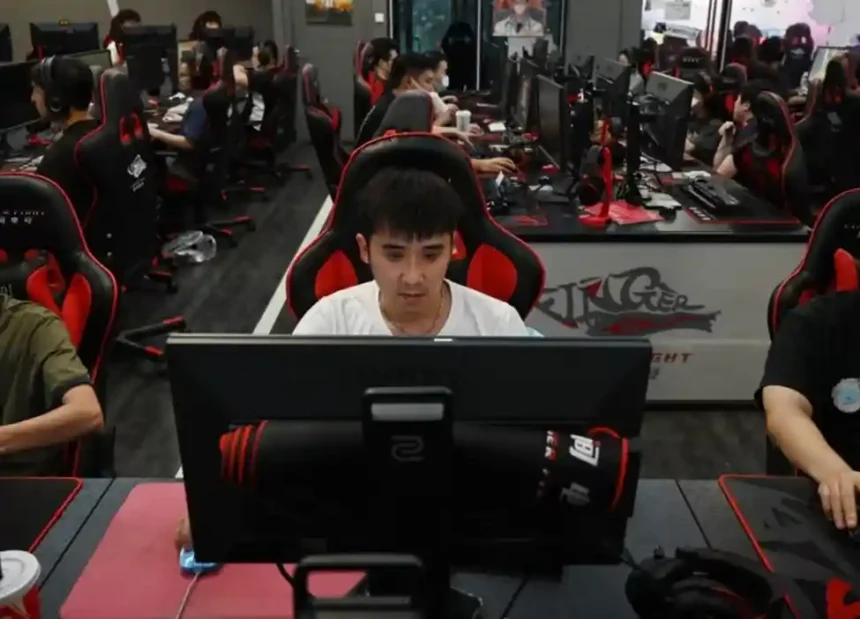New Guidelines to Control Gaming Habits
China’s National Press and Publication Administration Introduces Stricter Regulations
China has introduced proposed rules for online gaming, aiming to regulate purchases and curb excessive playing behavior. The guidelines, issued by the National Press and Publication Administration, are open for public feedback until January 22. Companies may face restrictions on offering incentives for daily gameplay or in-game purchases. The regulations also limit the frequency of adding funds to online accounts, known as wallets, and highlight the dangers of irrational gaming behavior that can lead to addiction.
Government Warns Against “Illogical” Actions
Stringent Measures to Safeguard Public Order
The government emphasizes the prevention of “illogical” actions in gaming and bans content that endangers public order. Companies are required to send warning messages to users displaying irrational playing behavior. To enhance data security, the regulations mandate game publishers to store servers within China. The announcement led to a significant drop in shares for major Chinese gaming companies, including a 16% decrease for Tencent and a 25% fall for NetEase.
Continuation of Gaming Regulations
Impact on Industry and Company Responses
These proposed rules follow 2021 regulations limiting online gaming for young people to three hours per week. Chinese gamers must provide identification when registering online. Despite concerns in the industry, Steven Leung of UOB Kay Hian suggests that the potential impact is more of a policy threat than the regulation itself. Tencent Games’ Vice Chairman, Vigo Zhang, reassures that the company’s business model won’t need significant changes, as it has been compliant with existing regulations. The industry anticipates a key rule requiring regulators to review game approvals within 60 days, while on the same day, China approved the release of 40 new imported games.
China Gaming Laws 2024: A Complete Guide to New Rules & Restrictions
(Focus keywords included: china gaming laws, gaming laws, china gaming)
China’s gaming laws in 2024 have reshaped the entire industry, bringing stricter rules for minors, tighter company compliance requirements, and stronger data-security measures. These updated china gaming laws aim to reduce gaming addiction, control spending, and regulate content across the fast-growing china gaming market.
🎮 Daily Gaming Limits for Minors
Under the 2024 guidelines, minors now face reduced playtime:
- 1 hour per day on weekdays
- Up to 2 hours per day on weekends and holidays
- Gaming banned between 10 p.m. and 8 a.m.
- Real-name verification and ID checks required
These restrictions are designed to prevent addiction and promote healthier habits among young gamers.
⚠️ Penalties for Companies That Break Gaming Laws
Companies that fail to follow china gaming laws can face:
- License suspension or revocation
- Heavy financial fines
- Criminal charges for serious violations
- Mandatory removal of games from app stores
Regulators actively enforce these rules to protect minors and maintain public order.
🧠 “Spiritual Opium” Concerns and Policy Impact
China’s strict stance is rooted in concerns that excessive gaming acts as “spiritual opium,” harming youth well-being and academic performance. This belief influences many of the tougher restrictions seen in the 2024 updates.
📝 Licensing Requirements for Game Companies
Every game in China must be approved by the National Press and Publication Administration (NPPA).
Companies must:
- Apply for a license before launching a game
- Renew licenses annually
- Meet content, data, and technical standards
- Remove or edit content that violates national guidelines
Without NPPA approval, a game cannot legally operate in the China gaming market.
🚫 Content & Practice Restrictions
Under current gaming laws, developers cannot include:
- Content harming national security
- Material disturbing social order
- Excessive spending incentives
- Rewards that encourage long play sessions
- Banned themes, violence, or politically sensitive material
Games must also issue warnings to users showing irrational gaming behavior.

🧩 Spending & Playtime Regulations
The new rules introduce strict limits:
- Max spending per game: 400 yuan/month
- Minors: 90 min playtime on weekdays, 3 hours on weekends
- No incentives for daily logins or excessive purchases
- Limits on wallet top-ups
These measures target unhealthy spending and gaming habits.
🛡️ Anti-Addiction Systems for Minors
Companies must implement:
- Real-name registration
- Face/ID verification
- Automated shutdown when minor time limits expire
- Warning messages for excessive play
Online gaming for minors is allowed only between 8 p.m. – 9 p.m. on weekends and holidays.
🌐 Data Protection Requirements
China gaming laws require companies to:
- Store servers inside China
- Obtain clear user consent before collecting data
- Secure all personal information
- Follow Chinese cybersecurity and privacy regulations
Failing to comply can result in massive penalties.
🏢 Major Players in the China Gaming Industry
The two largest companies dominating the market are:
- Tencent – Over 50% market share
- NetEase – Around 20% market share
Their stock prices often react strongly to regulatory news, showing how influential china gaming laws are.
🎯 Impact of “Common Prosperity” Policy
China’s push for “common prosperity” increases scrutiny on tech giants, ensuring:
- Fair competition
- Reduced market monopolies
- Balanced distribution of digital power
This movement heavily shapes gaming regulations today.
🚀 How Big Is China’s Gaming Market?
- Over 660 million players
- Tens of billions in yearly revenue
- Massive exports and global influence
- Rapid growth in esports and mobile gaming
Despite strict laws, China remains the world’s most profitable gaming market.

🔨 Enforcement Actions Taken by Regulators
Authorities routinely:
- Remove non-compliant games
- Ban titles like Clash of Kings and Mobile Legends temporarily
- Penalize publishers violating spending or content rules
- Conduct server audits and data checks
Non-compliance leads to immediate action.
🛠️ How Developers Adapt to China Gaming Laws
Publishers now:
- Reduce playtime options
- Add anti-addiction features
- Align content with cultural and moral standards
- Simplify monetization models
- Strengthen ID verification systems
Companies must constantly adjust to remain compliant.
📝 Conclusion: The Future of China Gaming Laws
The china gaming laws of 2024 bring tighter controls over minors, content, spending, licensing, and data security. While strict, these gaming laws aim to promote healthy gameplay, protect minors, and maintain social stability. For developers and companies, full compliance is essential to survive and thrive in the enormous China gaming market.
















